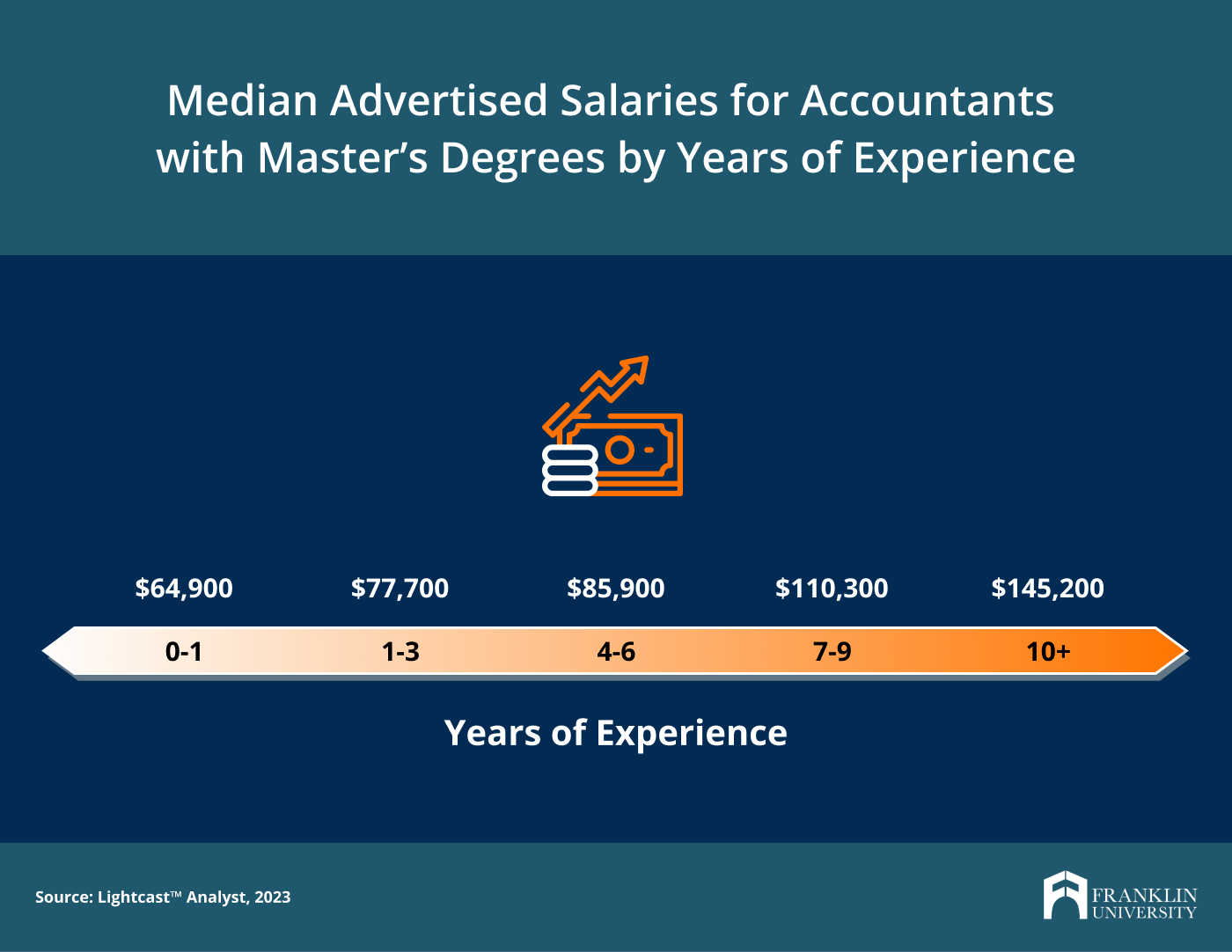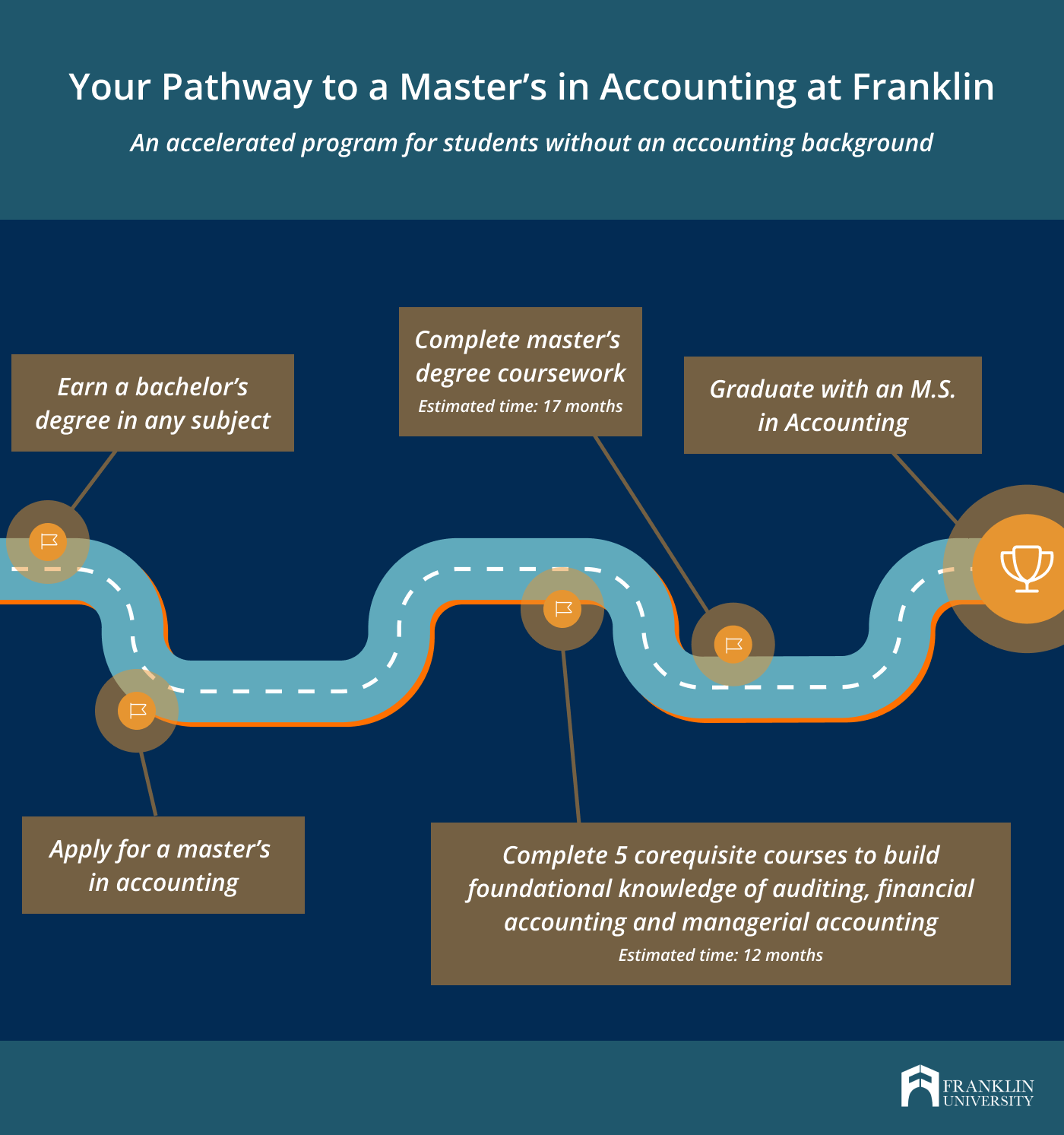Request Information
We're Sorry
There was an unexpected error with the form (your web browser was unable to retrieve some required data from our servers). This kind of error may occur if you have temporarily lost your internet connection. If you're able to verify that your internet connection is stable and the error persists, the Franklin University Help Desk is available to assist you at helpdesk@franklin.edu, 614.947.6682 (local), or 1.866.435.7006 (toll free).
Just a moment while we process your submission.

Can You Get an Accounting Master’s Without a Bachelor’s in Accounting?
Are you looking for a versatile, stable and lucrative career that’s in demand in every region and every industry?
Accounting may be right for you.
Every company — from Fortune 500 corporations to mom-and-pop shops — needs accounting expertise. That means accountants can build a rewarding career in virtually any kind of work setting, with roles including public accounting, financial analysis, risk management and more. And demand is only increasing. Lightcast, a leading labor analytics firm, estimates that the number of positions for accountants and auditors in the United States will increase 10.6% by 2032.
A master’s in accounting is one way to gain the education and expertise needed to succeed. But can you earn this degree without a bachelor’s in accounting, or do you need to start your education from scratch?
What is a Master’s in Accounting?
A master’s in accounting is a graduate degree that helps students build expertise in advanced accounting topics ranging from auditing processes and forensic accounting to complex tax considerations. Today, accounting master’s programs also introduce students to digital research and analysis tools and technologies.
While some accounting professionals pursue a master’s degree mid-career, it’s also an excellent way to transition into accounting from another field. In addition to teaching accounting principles and methods, a master’s program can help you prepare for and earn the credit hours you need to achieve industry certifications like the Certified Public Accountant (CPA), Certified Management Accountant (CMA), Certified Internal Auditor (CIA) or Certified Fraud Examiner (CFE).
“A master’s program in accounting provides a more comprehensive, in-depth education than undergraduate coursework or a certification,” explains Tracie Miller, chair of Franklin University’s B.S. and M.S. in Accounting. “Employers often value candidates with a master’s degree and this can provide a competitive advantage. A master’s degree can open doors to better job prospects, advancement and increased earning potential.”
What Do You Learn in a Master’s in Accounting?
The specific curriculum of each master’s in accounting program is different. However, most programs include accounting research, tax research and financial accounting theory coursework.
Electives may include additional coursework in forensic accounting, enterprise risk management, management control processes and advanced tax strategies. Some schools, like Franklin, offer master’s degrees with specific focus areas to help students prepare for more specialized roles. Students in Franklin’s M.S. in Accounting program can choose to focus either on financial operations or taxation. The financial operations focus is an excellent fit for students who wish to pursue roles as auditors, controllers or chief financial officers, while the taxation focus prepares students to work as tax advisors or consultants for individuals or organizations.
Ready to make your move in accounting? Gain insights for every career stage in our free Accounting Career Guide.

Can You Get a Master’s without a Bachelor’s?
Generally speaking, accredited master’s degree programs in the United States require that applicants hold a bachelor’s degree from an accredited college or university. If you have not yet earned an undergraduate degree, you may wish to consider entering the field by pursuing a bachelor’s degree in accounting.
Franklin’s B.S. in Accounting program is offered 100% online and is designed for working adults, with the flexibility to fit around your personal and professional commitments. If you have previously earned undergraduate credits, you may be able to take advantage of Franklin’s generous credit transfer program to graduate sooner.
Can You Get an Accounting Master’s without a Bachelor’s in Accounting?
Entrance requirements for master’s in accounting programs vary by school. Many require an undergraduate degree in accounting or a related field, such as business or finance.
Some accounting master’s programs are open to students with an unrelated bachelor’s degree; however, they often require that students complete prerequisite coursework before they apply.
Franklin University’s M.S. in Accounting program offers a unique pathway to accounting program for students with unrelated bachelor’s degrees. You can apply without any prerequisite coursework, no matter what you studied as an undergraduate. Once admitted, you will complete five required corequisite courses at Franklin or another accredited institution alongside your master’s-level coursework. Alternately, if you have work experience in the field, that can be evaluated to determine if the corequiste courses can be waived.
The corequisite courses, listed below, are carefully selected to help you build the strong foundation you need to succeed in the graduate program and your career.
- Financial Accounting
- Managerial Accounting
- Intermediate Accounting I
- Intermediate Accounting II
- Auditing
While you may complete equivalent courses at another institution to meet your corequisite requirements, Franklin’s pathway program is specially designed to streamline your transition from another field into accounting.

Jumpstart Your Accounting Career at Franklin
Ready to launch your accounting career? Franklin’s pathway to a master’s in accounting for students with an unrelated bachelor’s degree can help you get there faster.
Students without an undergraduate degree in accounting can complete Franklin’s 100% online M.S. in Accounting degree program, including all corequisite coursework, in as few as 29-31 months, about two and a half years. This pathway allows you to avoid the time and expense of earning a second bachelor’s degree, and may enable you to enter the accounting field at a higher level and qualify for more advanced roles.
Total program tuition for students without an undergraduate accounting degree is less than $30,000 (including master’s coursework and corequisites), so you can earn a degree that fits your ambitions and budget.
Regardless of your background, Franklin’s expert faculty is committed to helping you transition into accounting. You’ll learn from expert practitioners and get the support you need to achieve your professional goals.
Learn more about how an accounting master’s degree from Franklin University can help you build your future.





